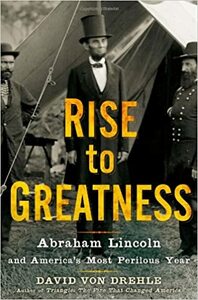Take a photo of a barcode or cover
One of several books about Abraham Lincoln, that I have read. Great book and easy to read.
"Rise to Greatness" follows the year 1862, a year which could have made or broken the United States, and it's president. The book follows events of this fateful year month-by-month. While the main focus is on Lincoln, it does pull away from the White House as events require - to the battlefield, Europe, even a conflict with the Sioux tribe in Minnesota. Lincoln has victories and losses throughout, both as a president and as a father. I found this book well written and researched, it was a fascinating narrative.
This book gave new meaning to "Team of Rivals." von Drehle goes through a year during the war when the cabinet, political parties, foreign leaders and generals were a ll "at war" at one time or another with Lincoln. I'm amazed at his ability to survive, move with great political instincts among the fractious group to victory.
Von Drehle's theme for this book is one year can make or break a country. An amazing account of the political successes, battleground failures, and collage of personalities that walked across 1862's stage. Great distillation of Lincoln's personality, both the strengths and the weaknesses. Readers will come away with a firm belief in the notion that all things are connected. But I never did figure out why anyone could have thought McClellan was a great military leader, nor why his troops adored him.
"Rise to Greatness" has the perfect amount of detail for my taste, and I like how it's divided with one chapter for each month page of 1862. The main focus is the Civil War and the Emancipation Proclamation, but there are some interesting personal facts thrown in as well. I think the author does a good job of portraying Lincoln's genius without deifying him or glossing over his mistakes. This is a great pick for people who are not Lincoln experts but want to go a little deeper than the typical biography.
The best new book about Lincoln and the Civil War that I've read in decades. Von Drehle attained a near perfect balance of pertinent detail without unnecessary background. He covers the military and political aspects in almost equal measure. One of the parts I found most interesting was the formation of the Union League, perhaps America's first PAC.
Much like David McCullough's "1776" this book left me wishing the author would follow up with a volume about the following year.
Much like David McCullough's "1776" this book left me wishing the author would follow up with a volume about the following year.
Good book. A little bogged down with details at times, but the narritive carried right along for the most part.
Amazing and enlightening. I thought it was as good as "Team of Rivals."
If you elect to read the audio edition of this, one or two of you will see the reading time and discard it. At 17 hours and change, this isn’t something you’ll finish in a single sitting. But finish it you will, because VonDrehle’s writing style is so compelling and readable that when you finish, you’ll find it hard to believe the book was that long. It just won’t feel like it.
The book begins with a New Year’s Day event at the White House in which Lincoln greets dignitaries, and then he welcomes the entire community into the White House where he spends hours shaking hands. At the conclusion of the event, his hand is actually sore and trembling. The book ends with yet another New Year’s Day celebration at the beginning of 1863 when the recently signed Emancipation Proclamation is officially in effect. The book then breaks down, on a month-by-month basis, 1862 from the perspective of battles fought and decisions Lincoln made that, according to the author, tipped the war in favor of the union.
Of course, you’ll read about the death of Lincoln’s son, Willie, and about the horrific toll it took on Lincoln and his wife, especially her. But you’ll read stuff you perhaps never knew as well. I was unaware that Lincoln actually participated in a small military action in which he briefly led a small group of soldiers if I understood that part of the book correctly. You agonize with him over decisions about which general should be in charge of which aspects of the war. You see his perspective on the firing and rehiring of the egotistical, vain George B. McClellan as the commander of the Army of the Potomac.
You’ll be there in September at the Antietam battlefield, a bloody business that drove Confederate invaders out of Maryland and back into Virginia. The Federal victory that fall enabled Lincoln to publish with boldness the Emancipation Proclamation that would take effect in January of 1863.
I wasn’t a fan of the voices the commercial narrator used to delineate the people in the book. They aren’t over-the-top horrible, but I would have preferred a less vocally different narration. This is the kind of nonfiction you read even if nonfiction books scare you a bit. The author ensures that 1862 is highly approachable by anyone regardless of your knowledge of that time in our history. I gained much from this book, and I suspect you will as well.
The book begins with a New Year’s Day event at the White House in which Lincoln greets dignitaries, and then he welcomes the entire community into the White House where he spends hours shaking hands. At the conclusion of the event, his hand is actually sore and trembling. The book ends with yet another New Year’s Day celebration at the beginning of 1863 when the recently signed Emancipation Proclamation is officially in effect. The book then breaks down, on a month-by-month basis, 1862 from the perspective of battles fought and decisions Lincoln made that, according to the author, tipped the war in favor of the union.
Of course, you’ll read about the death of Lincoln’s son, Willie, and about the horrific toll it took on Lincoln and his wife, especially her. But you’ll read stuff you perhaps never knew as well. I was unaware that Lincoln actually participated in a small military action in which he briefly led a small group of soldiers if I understood that part of the book correctly. You agonize with him over decisions about which general should be in charge of which aspects of the war. You see his perspective on the firing and rehiring of the egotistical, vain George B. McClellan as the commander of the Army of the Potomac.
You’ll be there in September at the Antietam battlefield, a bloody business that drove Confederate invaders out of Maryland and back into Virginia. The Federal victory that fall enabled Lincoln to publish with boldness the Emancipation Proclamation that would take effect in January of 1863.
I wasn’t a fan of the voices the commercial narrator used to delineate the people in the book. They aren’t over-the-top horrible, but I would have preferred a less vocally different narration. This is the kind of nonfiction you read even if nonfiction books scare you a bit. The author ensures that 1862 is highly approachable by anyone regardless of your knowledge of that time in our history. I gained much from this book, and I suspect you will as well.




